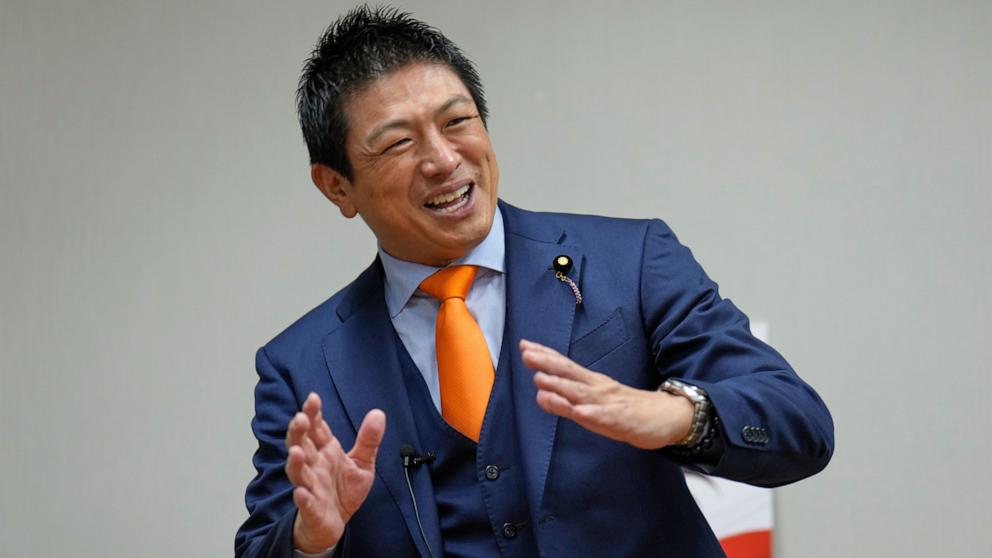TOKYO: On a crowded street near a major train station outside Tokyo, hundreds of people gathered this week to cheer Sohei Kamiya, the leader of Japan’s fast-rising nationalist party, Sanseito. Waving Japanese flags and chanting slogans, they roared as Kamiya condemned the country’s growing foreign population, calling it a threat to Japan’s identity. His message, once confined to fringe circles, is now resonating with a growing segment of Japanese voters frustrated by economic stagnation and rapid demographic decline.
Kamiya’s fiery “Japanese First” message has propelled his party into the national spotlight after a surprisingly strong performance in July’s parliamentary elections. While Sanseito remains a minor force in parliament, its rise has unsettled Japan’s political establishment and fueled broader debates about immigration, globalization, and the preservation of national culture. The nationalist wave comes at a moment of deep uncertainty, as Japan struggles to sustain its workforce and economy amid a population crisis that is accelerating faster than expected.
At the rally, Kamiya dismissed accusations of racism from nearby protesters. Surrounded by police and bodyguards, he shouted back that he was simply defending common sense and the dignity of Japanese citizens. His supporters cheered loudly, many holding placards warning of “foreign influence” and “globalist control.”
“Mr. Kamiya is saying what most of us are afraid to say,” said Kenzo Hagiya, a retired civil servant who stood near the stage. “People feel their jobs and traditions are being threatened. He speaks for those who are tired of being ignored.”
The rise of Sanseito and other nationalist movements has been linked to economic frustration, falling wages, and rising prices. Many Japanese, especially older citizens, believe foreign labor and foreign-owned businesses are eroding traditional values and worsening local problems.
Japan’s leaders face a painful contradiction. The country’s economy depends on foreign labor to offset its shrinking and aging population, yet public hostility toward immigrants is growing louder. In September, false rumors spread online about an influx of African migrants, sparking protests that forced the cancellation of a municipal exchange program.
Even the ruling Liberal Democratic Party, long a proponent of foreign tourism and limited labor migration, has shifted tone. Candidates vying to replace outgoing Prime Minister Shigeru Ishiba have echoed voter anxiety, promising tougher restrictions on immigration. Among them, former Economic Security Minister Sanae Takaichi drew criticism after citing unverified claims that foreign tourists abused deer in her hometown of Nara, saying she only wanted to express the anger of ordinary citizens.
Kamiya, who often accuses corporate elites of exploiting foreign workers for profit, told supporters that the government has betrayed its own people. “Why are foreign workers prioritized while Japanese families struggle?” he asked at the Yokohama rally. “We want fairness and safety, not chaos.” His rhetoric has found an eager audience among working-class voters disillusioned with mainstream parties.
During the election campaign, far-right candidates repeatedly targeted Japan’s small Kurdish community, accusing them of criminal activity. Many Kurds, who fled persecution in Turkey, say they now face daily harassment. Discrimination has also resurfaced against Chinese and Korean residents, communities that have long endured prejudice dating back to Japan’s imperial era.
Foreigners make up only 3% of Japan’s population, but their visibility has increased sharply. Last year, the country’s foreign population reached a record 3.7 million, including 2.3 million workers who now fill essential roles in manufacturing, retail, and agriculture. Despite alarmist claims, the National Police Agency reported just 12,000 arrests of foreign nationals in 2023, a fraction of total crime figures.
Vietnamese resident Hoang Vinh Tien, who has lived in Japan for over 20 years, said the hostility worries him. “I understand the need to protect Japan’s culture,” he said, “but foreigners like me also contribute. We work, we pay taxes, and we try to integrate.”
Experts warn that Japan cannot afford to shut itself off. Studies show that the country will need at least 6.7 million foreign workers by 2040 to maintain even modest economic growth. Without them, key sectors such as farming, fishing, and elder care will face collapse. Yet the same foreign workers Japan needs are increasingly reluctant to come, deterred by low pay and rising xenophobia.
The roots of today’s prejudice, says Kansai University professor Toshihiro Menju, lie in Japan’s “stealth immigration policy,” which brings in foreign labor quietly but fails to prepare the public for demographic change. “Foreign workers are treated as temporary help, not as part of society,” Menju said. “This creates misunderstanding and resentment on both sides.”
Kamiya’s political ascent is built on this resentment. A former local assemblyman from Osaka, he began cultivating followers online in 2020 with a mix of nationalist rhetoric, conspiracy theories, and anti-globalist messages. His YouTube speeches drew millions of views, and his movement quickly gained traction among disaffected voters.
He has drawn inspiration from right-wing movements abroad, praising elements of Donald Trump’s populist agenda and hosting American conservative activist Charlie Kirk in Tokyo shortly before his death. Kamiya has compared Sanseito to Europe’s far-right parties, including France’s National Rally and Germany’s AfD, saying they share a mission to “protect the nation’s soul.”
As Japan approaches a new political crossroads, the stakes are rising. With the ruling party leadership vote looming and public frustration simmering, nationalism is finding a powerful voice in a country long known for restraint. Whether this marks a lasting shift in Japan’s political landscape or a temporary backlash remains uncertain, but for now, the message of Sohei Kamiya and his supporters is echoing louder than ever in a nation struggling to balance identity, stability, and survival.



